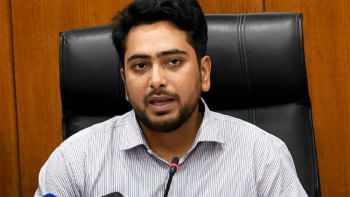Agri ministry takes Tk 7,214cr project

The agriculture ministry is planning to take up a Tk 7,214 crore project to promote crop diversification and ensure food safety, aiming to gradually reduce the country's dependency on imports.
The ministry plans to extend the cultivation area of non-rice cereals such as pulses, oilseeds and horticulture crops by 2 lakh hectares. Currently, the country has 88.29 lakh hectares of cultivable land.
Under the five-year project, the government will provide a "Krishak Smart Card" to each of 1.8 crore farmers so that they can get input subsidies and credit support, according to documents of the planning commission and agriculture ministry.
These two are among the project's 10 objectives. The others include improving irrigation systems, setting up new laboratories for export commodities, increasing crop research and development and using technology for evaluation.
The ministry plans to involve several of its departments to implement the project starting July 2023 with the Department of Agricultural Extension as the lead agency.
The project, titled "Programme on Agricultural and Rural Transformation for Nutrition Entrepreneurship and Resilience in Bangladesh (PARTNER)", will be mostly funded by the World Bank and the International Fund for Agricultural Development (IFAD).
However, around Tk 1,454.65 crore will come from the government exchequer.
It will also train up 20,000 youths and women entrepreneurs and build up resilience in the agri-food value chain of Bangladesh.
"We are hopeful to build a solid foundation for the country's agriculture sector through this project to face the challenges of the graduation from the least developed country status in 2026," said Wahida Akter, secretary to the agriculture ministry.
"Whatever we wanted to do in agriculture for so long, through this project, we want to coordinate everything," she said.
On distributing the "Krishak Smart Card", she said a database of farmers would be created across the country to ensure that the government benefits reach the real farmers.
However, the agriculture ministry last year had taken the same sort of programme, introducing "smart cards" for 1.09 crore farmers with an aim to provide area-based and demand-based agricultural services.
It was supposed to be used as farmers' digital identity, which would help them get government incentives as well.
To this effect, a pilot project involving Tk 108 crore is already in the pipeline to provide digital services to farmers in 14 agricultural zones of nine districts.
Asked why the same type of programme is being undertaken, she said they had taken up the first project as per their "digitalisation plan".
But when they got a "more updated" proposal from the World Bank, they scrapped the first project, she said.
"From the PARTNER project, each family will get a single smart card but earlier (under the previous project) more than one family member was allowed to get the card," she said.
"We are not running the previous project," said Akter.
Akter also said the PARTNER programme's cards would be very "effective" and provide additional facilities.
The previous project's card was stipulated to cost Tk 56 but under the new project, the cards would now cost Tk 270 to Tk 275, she said.
Under the project, the ministry also plans to increase the area being used for the cultivation of fruits and vegetables through Good Agricultural Practices to three lakh hectares while high-yielding rice varieties to two lakh hectares.
Talking to The Daily Star, Md Shakhawat Hossain Sharif, a focal point officer of the project, said they have mainly focused on crop diversification as well as exploring export possibilities through this project.
"We want to set up modern lab facilities and accredited testing processes for agricultural commodities to ensure global standards for food exports," he said.
The project is now under the supervision of the planning commission, and it will finally be placed at the Executive Committee of the National Economic Council for final approval, he said.


 For all latest news, follow The Daily Star's Google News channel.
For all latest news, follow The Daily Star's Google News channel. 








Comments